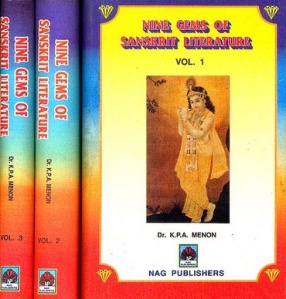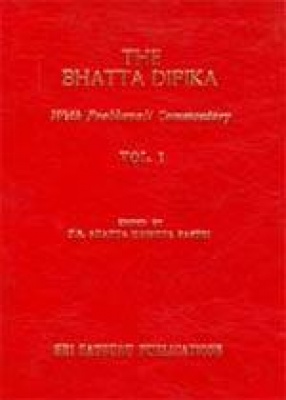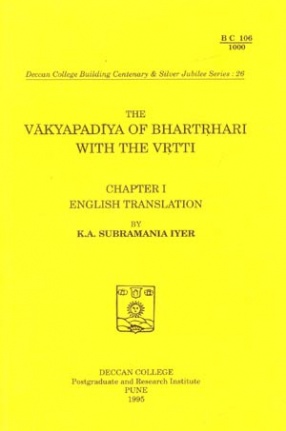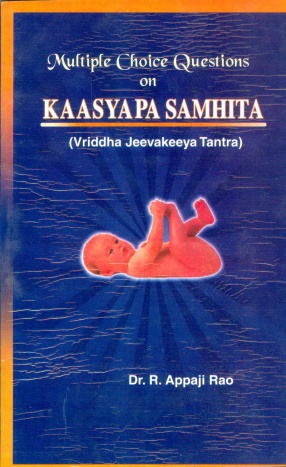Nine Gems of Sanskrit Literature (In 3 Volumes)
About the Book (Volume 1)
Selecting a few out of the large number of brilliant gems glittering in the firmamant of Kerala’s Sanskrit literature is not an easy task. Special attention has therefore been given to those compositions of great merit which are not easily available to interested readers at present. In Kerala, students of Sanskrit used to make their entry into the world of kavyas with the short poem of Sriramodantam and Sukumara’s Srikrsnavilasam before making their acquaintance with Kalidasa and others. Unfortunately, both these compositions have practically gone out of circulation even in the state of their origin. Other poems included in the series are Kulasekhara’s Mukundarnala, Vasudeva Bhattatiri’s Yudhisthiravijayarn, two compositions of Lilasuka, the Message Poem, Sukasandesa of Laksmidasa and two short hymns of Adi ·Sankara.
Sukumara’s Srikrsnavilasam is a rnahakavya, dealing with the birth and exploits of Lord Krsna. The poet has made no secret of the fact that he is an ardent admirer of Kalidasa and he has tried to faithfully follow the foot-steps of the great master in many respects. The poem stops abruptly in the middle of the 12th Canto while Krsna is making on aerial journey in the company of his beloved wife Satyabharna giving a strong indication that death might have intervened before he could complete the work.
About the Book (Volume 2)
This second volume of the ‘Nine Gems of Sanskrit Literature contains one of the three famous Yamaka Kavyas of Vasudeva Bhattatiri, who is believed to have been a contemporary of the famous Cera Emperor, Ramavarma Kulasekhara (A.D. 885-917). There are references to his patron monarch in all the three poems and the poet also· speaks about his preceptor, a Bharataguru with great reverence.
Vasudeva’s Yudhisthiravijam is rightly acclaimed as the greatest among the Yamaka·compositions. As the title indicates ‘Yudhsthiravijayam deals with the victory of Yudhisthira the eldest of the Pandavas over the evil forces represented by Duryodhana and the hundred Kaurava brothers. It starts with King Pandu’s departure to the Himalayan forest and the birth of the Pandavas. Subsequently it deals with the rivalry’ between the Pandavas and Kauravas that led to the war of annihilation in which the Pandavas ultimately came out victorious.
Two more Yam aka Kavyas with the titles, Tripuradahanamand Saurikathodaya are well known compositions of the same poet and it is hoped that these may also become available to interested scholars in the near future through the efforts of the present commentator.
About the Book (Volume 3)
This third volume of ‘Nine Gems of Sanskrit Literature’ starts with Mukundarnala, the’ oldest among’ the Vaishnavite lyrics, ascribed to King Kulasekhara who finds his place among the twelve Alvars. It is followed by the Kalavadhakavyam and Durgastuti of the famous saint poet, Lilasuka with the alternative name of ‘Vilvamangala’. Kalavdhakavya deals with the death of the god of death at the hands of Lord Mahesvara, whom he’ annoys by trying to snatch away his devotee Markandeya. Though an ardent devotee of Krsna in the form of Venugopala Lilasuka has composed innumerable hymns in praise of other gods and goddesses as well. Durgastuti is a hymn in praise of one of the local deities of the famous Sukapuram village of South Malabar. Sriramodantarn is a short poem of 153 verses dealing with the story of Rarna, with which students used to start their study of Sanskrit kavyas in Kerala. Sukasandesarn is a Message Poem of the 14th century of poet Laksmidasa on the model of Kalidasa’s Meghadntarn. The collection ends with two short hymns dealing with the quintessence of advaita philosophy, so much compressed into so few words as only the great preceptor Adi Sankara could have done.
Get it now and save 10%
BECOME A MEMBER







Bibliographic information